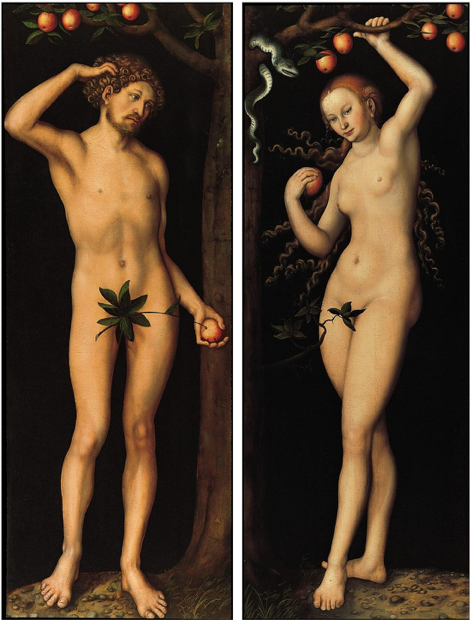In a disappointing ruling rejecting the appeal of Holocaust claimant Marei von Saher, the Ninth Circuit decided in July that the Norton Simon Museum in Pasadena may keep Lucas Cranach the Elder’s works Adam and Eve (image below).
Jewish art dealer Jacques Goudstikker purchased the works in 1931, when he was still working in the Netherlands. During the German occupation of The Netherlands, Goudstikker fled and the works were forcibly acquired by infamous art-hungry Nazi leader Hermann Göring when he took control of Goudstikker’s company. After the war, the Allies recovered the paintings and returned them to the Dutch government pursuant to Allied restitution practice. The Dutch, however, sold the works to George Stroganoff-Scherbatoff, rather than return them to the Goudstikker heirs. Stroganoff-Scherbatoff sold them to the Norton Simon in 1971. Goudstikker’s heir Marei von Saher initiated suit against the Museum more than 10 years ago, arguing that the pieces were looted by the Nazis and should be returned to her.

Adam and Eve, Lucas Cranach the Elder, ca. 1530. Image via Wikimedia Commons.
The case has traveled up and down the federal courts multiple times since then. The district court most recently ruled that Goudstikker’s widow failed to make a claim for the works within the highly restricted time period required by Dutch law after the end of the War. In the most recent decision, the Ninth Circuit affirmed the outcome but relied instead on the act of state doctrine, which calls for U.S. courts to defer to the official acts of foreign sovereigns. On this theory, the Court of Appeals declined to invalidate “an official conveyance from the Dutch government to Stroganoff thrice ‘settled’ by Dutch authorities.”
Cultural Heritage Partners was honored to represent current and former members of Congress before the Ninth Circuit as amici curiae supporting restitution of the works to the Goudstikker heir. Working with current Representatives Eliot Engel (D-NY) and Jerry Nadler (D-NY) and former Representatives Mel Levine and Robert Wexler, CHP lawyers Tom Kline, Eden Burgess and Jennifer Morris filed an amicus brief explaining and documenting that United States’ Holocaust restitution policy requires Nazi-looted art to be returned to the original theft victim. Twelve additional members of Congress later submitted a letter to the Ninth Circuit expressing their support for the arguments advanced in the amicus brief.[1]
Congressional amici asked the Court of Appeals to recognize and apply U.S. restitution policy, which dictates “that claims should be decided on their merits, under an ethical, moral policy approach, and with efforts to achieve a ‘just and fair solution’ to claims.” The amici also reminded the Ninth Circuit:
[After the war,] property looted by the Nazis and recovered by the Allies was to be returned to the owner. External restitution never intended to transfer title to the country of origin, as doing so would essentially hold a theft to be a valid transfer.
By allowing the Museum to keep the works and thus benefit from Göring’s theft, the Ninth Circuit has validated that looting and the Netherlands’ post-war failure to restitute the works to the Goudstikker heirs. This outcome flies in the face of long-standing U.S. policy “that Holocaust claimants should, wherever possible, have their claims adjudicated promptly and on the merits so they may receive a just and fair resolution of their claims.”
The amicus brief is available here: Amicus Brief, 16-56308
The Ninth Circuit’s opinion is available here:http://cdn.ca9.uscourts.gov/datastore/opinions/2018/07/30/16-56308.pdf
== == == == == == == == == == == == == ==
[1]The Members on the letter were: Carolyn B. Maloney (D-NY), Adriano Espaillat (D-NY), Kathleen M. Rice (D-NY), Grace Meng (D-NY), Nydia M. Velázquez (D-NY), Brian Higgins (D-NY), JoséSerrano (D-NY), Peter T. King (R-NY), Nita M. Lowey (D-NY), Daniel M. Donovan, Jr. (R-NY), Paul D. Tonko (D-NY), and Louise McIntosh Slaughter (D-NY) (deceased).